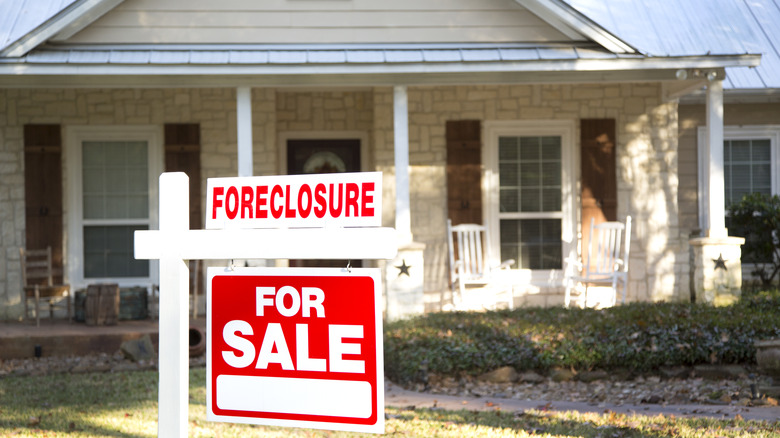What Is A Resurrected Zombie Mortgage (And Should You Be Frightened?)
Homeownership was long considered a major milestone of adult life in America. While that fact is rapidly changing due to high prices and rising interest rates today, during the housing boom of the early 2000s, nothing said you'd reached the pinnacle of independence like getting a mortgage and owning your very own home and the patch of land it stands on. When you own your home and property, generally no one can take it away from you, with a few rare exceptions such as eminent domain, as long as you pay your mortgage payments and your property taxes. That is, unless you're unfortunate enough to fall victim to debt collectors buying up zombie mortgages and cashing in on foreclosures.
A zombie mortgage is simply a second mortgage that a bank or mortgage company has stopped collecting on and then sold to a debt collector. Once these long-abandoned (or even "forgiven") loans are in the hands of an investor who has bought them up for as little as $1 each, there is motivation to resurrect them for the purpose of multiplying their money via repayment — with interest and penalties — or foreclosure. Consider this your guide to the frightening concept of zombie mortgages.
How did some home loans become zombie mortgages?
During the housing bubble of the early 2000s, many new homeowners were offered second mortgages for the purpose of covering their down payment. This allowed people who otherwise would not be able to afford to own homes to take advantage of the incredibly affordable prices sweeping the real estate market. These mortgages were known as 80/20 loans, since they consisted of a package deal featuring two mortgages: a first mortgage for 80% of the price of the property and a second mortgage for 20%.
Unfortunately, no one yet saw the signs that the housing market was about to crash. In 2008, it did just that, and adjustable sub-prime mortgage interest rates placed a large portion of these lower-income home buyers at risk for foreclosure. Instead, many were able to secure loan modifications to allow them to keep their homes. These modifications sometimes included forgiveness of their second mortgages. What the mortgage companies didn't mention is the fact that they could still sell these mortgages to debt collectors. As the value of real estate has risen in recent years, these debt collectors have finally found it worthwhile to collect on the loans that they purchased years ago for pennies on the dollar. Like zombies, these second mortgages have returned from the grave to haunt homeowners in the form of sudden bills for sometimes double the amount they once owed (including interest and fees) or even foreclosure notices.
What to do if you may have a zombie mortgage
Nearly all zombie mortgages are second mortgages. This means that if you only have one mortgage and you either paid a down payment or received a zero-down payment home loan, you likely don't ever need to worry about the resurrection of a zombie mortgage. On the other hand, if you did take on a second mortgage for the purpose of financing your down payment and have since had that second mortgage forgiven, absorbed, or modified, you could be at risk.
If you may have a second mortgage that is at risk of being resurrected, start by simply keeping an eye out for bills arriving from unfamiliar banks or companies. These statements may appear to be junk mail or scam attempts and can easily end up in the garbage if you aren't looking for them. If you have received statements or foreclosure threats on a zombie loan, you have options. You can dispute the legitimacy of the debt, based on the debt collector's failure to alert you to it or on an inaccurate balance. You can use your home's equity to pay off or pay down the mortgage. Or, you can file bankruptcy to try to protect your home from foreclosure. Regardless of which route you take, it is wise to consult a real estate or foreclosure attorney for guidance on your rights and the process.


